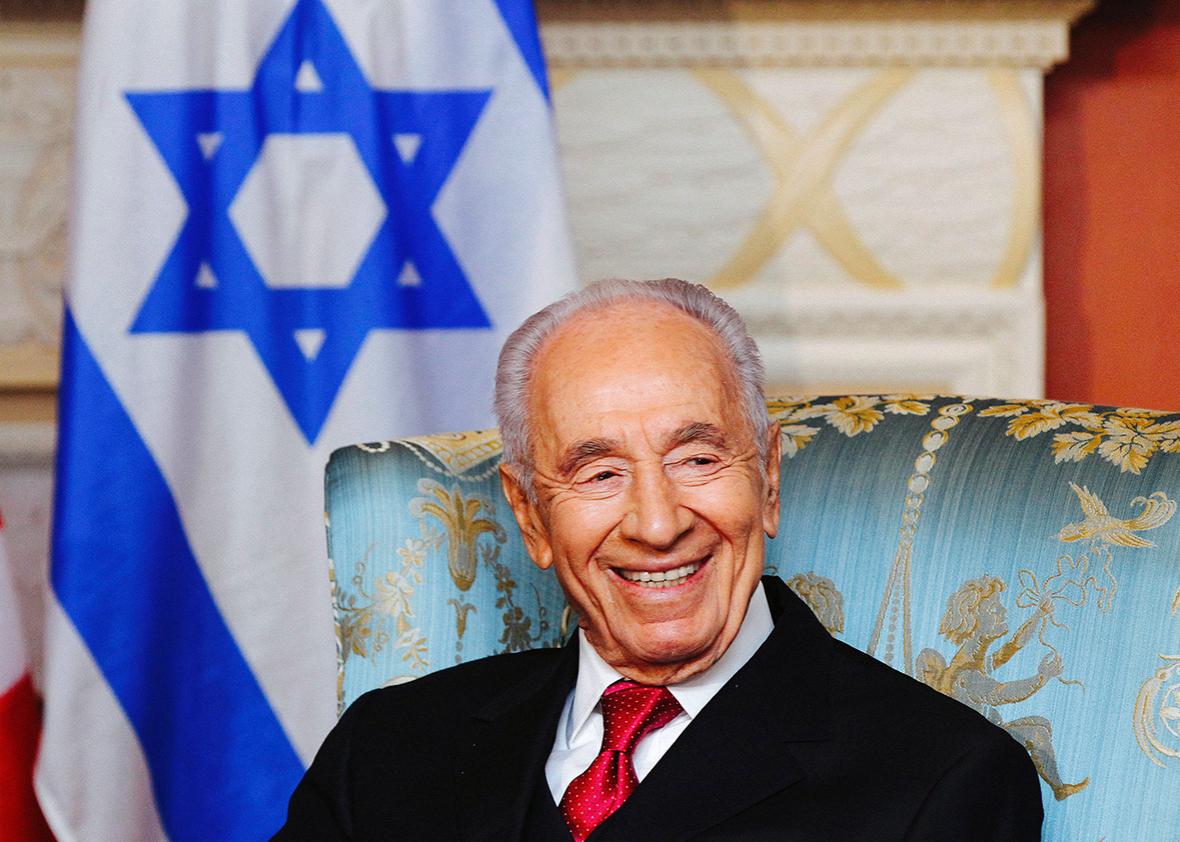The speech in which Shimon Peres announced his intention, for a second time, to run for Israel’s presidency, was typical him. As the story goes, the draft was written for him by some of his advisers, and the president-to-be asked to change it just a little bit. Peres, at that time, was 83 years old, and the draft speech said that this will be “my last contribution” to the country. But Peres was not yet ready for that. The math was simple: He’d become president at 83, for seven years. He’d retire at 90. So he asked his advisers to make this tiny change: from “this will be my last contribution” to “this might be my last contribution.” Always keeping his options for the future open, always optimistic about having more time for yet another push for something.
Peres, who died early Wednesday at age 93, once said that the optimist dies like everybody else does—he only lives differently. The story of his last round as a statesman, the seven years of him being Israel’s president, is exemplary of Peres’ power of optimism to change long-standing realities. Peres rejuvenated Israel’s office of the president, and with it he also rejuvenated his own image.
Peres wanted to be president, a mostly ceremonial role, when he was still a spring chicken at 77. In 2000 he announced his candidacy, but the Knesset, which is in charge of electing the president, blindsided him and elected Moshe Katsav. The disappointed Peres, experienced in political losses, went back to work in parliament and government.
Katsav added no prestige to the office. His predecessor, Ezer Weizman, had retired amid financial scandal. Katsav resigned from office amid assault and harrassment allegations and ended up convicted of rape and imprisoned. So in 2007, when Peres was finally elected, the presidency was in crisis. It was not even clear Israel needed a president.
Peres proved it did. He restored the office’s respect and influence. When the government of Israel had to engage itself in controversial deeds, often at odds with international public opinion, Peres’ president’s house enabled the world to keep celebrating Israel’s less controversial side. Its science and literature, its innovation and culture, refreshing chutzpah. The old man made Israel look young and trendy. His Israeli Presidential Conference brought dignitaries and intellectuals to Jerusalem without having to engage the government. The old man with the strange Polish accent, an accent that was with him until his last day and made him the ultimate target for satiric imitations, became a surprisingly fashionable public figure.
Peres was never satisfied, was never tired of looking for what to do next. Having been foreign minister and defense minister, finance minister and prime minister, having made Israel stronger at war and having tried to make it stronger at peace, his last project was remaking his own image. As he was revolutionizing the office of the presidency, he was also revolutionizing himself. From tricky Shimon, a man of great achievement yet small public appreciation, to Grandpa Peres, the above the fray, consensual founding father.
Peres earned a knotty reputation by being tireless and prone to political maneuvering and deception. When Yitzhak Rabin was prime minister for the first time in the mid-1970s, his rivalry with Peres—his defense minister and supposed political colleague—resulted in Rabin calling Peres “an indefatigable schemer.” Peres’ battle with Menachem Begin to become prime minister in 1981 was the ugliest campaign in Israel’s history. When Yitzhak Shamir was prime minister, Peres—then finance minister—planned and executed the so-called stinking maneuver: He toppled the government but failed to form a new one under himself.
With that history, along with the highly controversial Oslo Accords with the Palestinians that Peres initiated under the radar and then sold to Rabin (the prime minister at the time), Peres was hardly a beloved politician. In 1996, soon after the assassination of Rabin, Benjamin Netanyahu defeated Peres to become prime minister. Three years later Katzav defeated him to become president. Yet, in 2007, with his ascendency to the presidency, Peres managed one last transformation: This above-the-political-fray office gave him the opportunity to master the most unexpected maneuver: He became a man of the people. No longer despised by the mases. No longer ridiculed. Sure, he was still mocked, but this time fondly. His deficiencies were no longer annoying; they were entertaining. His pompous speeches were no longer granting; they were endearingly amusing. His stormy past was gradually transforming to Israeli folk tales.
This rejuvenation of character was distinctively Peres. It was still manipulative. It was still grandiose. It was still tireless. And it worked: When Peres died, having suffered a severe stroke two weeks ago from which he never recovered, Israel was eulogizing him almost without dissent. His great political rivals rushed to the airwaves to share fables and anecdotes. The people who fiercely opposed his agenda described him as one of Israel’s legendary leaders, which he was. The public seemed truly saddened by his death. The great man lived a political life of many intrigues but died as a beloved father figure. Tricky Shimon must be smiling somewhere, having completed yet another impossible feat.
